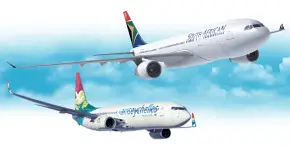Open Skies for Africa
“The potential for growth in tourism will not be realised unless we open the skies in Africa.” Gillian Saunders – Grant Thornton.
The liberalisation of Africa’s skies could spark significant growth in the tourism industry. Projections indicate that liberalisation between just 12 of the 54 countries on the continent would lead to an increase of more than one million tourists and the need for at least 40 additional 160 room hotels in those 12 countries. By Lianne Osterberger.
Grant Thornton’s analysis of InterVISTA’s liberalisation impact report, which was completed for IATA, has revealed some startling facts.
Gillian Saunders, Head of Advisory Services at Grant Thornton Johannesburg and Global Leader: Hospitality and Tourism for Grant Thornton International said that the long awaited liberalisation of Africa’s skies would have tremendous benefits for the continent’s trade and economic development, but particularly for tourism and the hotel industry.
Saunders presented Grant Thornton’s findings at the Africa Hotel Investment Forum (AHIF) which was held in Addis Ababa, Ethiopia in September 2014, where she addressed various investors, hoteliers, financiers and management companies.
The twelve countries in the IATA study are Algeria, Angola, Egypt, Ethiopia, Ghana, Kenya, Namibia, Nigeria, Senegal, South Africa, Tunisia and Uganda.
Grant Thornton’s analysis highlighted the benefits of implementing the Yamoussoukro Decision of 1999, which 44 African countries signed, committing to the liberalisation of air transport.
Liberalisation brings more routes, more frequencies, and lower fares. An additional positive aspect is that air traffic freedoms have the ability to shorten journey times as direct geographical routes eliminate extra stops, often saving 3 – 6 hours per trip.
However as, noted in a World Bank report by Charles Schlumberger, entitled Open Skies for Africa, published in 2010, these benefits are unfortunately not being achieved. The report reads: “A historic opportunity is being missed. Ten countries on the African continent have not signed onto or completed proper ratification of this decision, and many others that are signatories have not implemented it. Meantime, most countries in Africa that have abandoned their ailing carriers and opened up to foreign operators which now provide air services, both passenger and freight, that are more efficient, safer, and which are at more competitive prices.”
Says Saunders: “Other continents have experienced tremendous benefits from open skies and it is clear that Africa should follow suit. We live in a massive continent that is growing quickly and it would be a no brainer for air traffic not to be opened up as soon as possible.”
The potential for growth in trade, investment, and tourism markets, facilitated by intra-African transport will not be realised unless we open the skies in Africa. This was echoed by the CEO of Ethiopian Airlines, Tewolde Genbremariam, Saunders’ panellist at the AHIF discussion session. Mr Genbremariam concluded that an African-wide common agreement to deregulate the skies was necessary to allow African air connectivity to support the economic growth potential on the continent. Ethiopian Airlines is a success story on the continent supported by the Ethiopian authorities’ aggressive pursuit of liberal bilateral agreements to maximise open sky opportunities for its carrier.
Positive impacts
There is a huge amount of empirical data on the positive impacts of liberalisation. A World Trade Organisation study conducted in 2008, found that:
• 184 countries which had open sky agreements saw traffic increase of 30% on average, during the first year after liberalisation.
The pockets of liberalisation of air traffic in Africa that have happened also show that:
• South Africa-to-Kenya saw a 69% increase in passenger volumes after liberalisation occurred in 2000 and 2003.
• South Africa to Zambia relaxations which allowed a low cost carrier to enter the route saw passenger volumes rise 38%, fares decline by 38% and resulted in 6300 more tourists entering Zambia over the same period.
• Morocco to Europe open skies introduced in 2006 increased traffic on the routes by 160%.
Saunders did raise concerns that airlines in Africa also face other challenges in a market that is beset with many difficult conditions. As the largest outbreak of Ebola Virus Disease (EVD) ever recorded in history continues its spread at an alarming rate across the continent, health and quarantine regulations present difficult cross-border travel concerns for certain African countries. In addition rising energy costs are an ongoing challenge for African airlines, especially for those that were relatively new to the market and which are still developing economies of scale. Departure taxes are also excessively high for intra-Africa travel compared with the taxes paid on other continents. African airlines face impending taxes on carbon emissions too, which is another challenge.
Saunders said that opening Africa’s skies was overdue and encouraged authorities on the continent to take the steps to do so, in order to help their economies.
For more information contact Gillian Saunders: +27(0)11 322 4572 or visit www.gt.co.za





